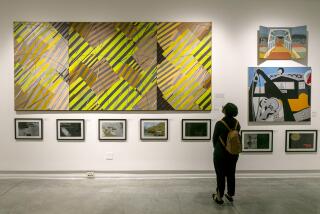Taylor Mead dies at 88; underground film legend and bohemian artist
Taylor Mead, an underground cinema legend whose comic charm and sense of the surreal inspired Andy Warhol and other seminal figures in the alternative film world, died Wednesday in Denver. He was 88.
A fixture of bohemian New York who was also a poet and artist, Mead was visiting family in Colorado when he had a stroke, said his niece, Priscilla Mead.
Called “the Charlie Chaplin of the 1960s underground,” Mead was an elfin figure with kewpie-doll eyes who appeared, by his count, in 130 films, starting with the 1960 art house classic “The Flower Thief.” In a review for the Village Voice, film critic J. Hoberman pronounced him “the first underground movie star.”
PHOTOS: Notable deaths of 2013
He later became one of Warhol’s first superstars, appearing in films such as “Tarzan and Jane Regained … Sort Of” and “Lonesome Cowboys.” He also was known for his work in Ron Rice’s “The Queen of Sheba Meets the Atom Man” and Robert Downey Sr.’s “Babo 73.”
Indie auteur Jim Jarmusch, who cast Mead in a moving vignette that closed his 2003 film “Coffee and Cigarettes,” considered Mead one of his heroes.
A dropout from a life of privilege, Mead allied himself with Allen Ginsberg, Jack Kerouac and other early leaders of the San Francisco Beat scene of the 1950s before settling in New York to eke out a living as a member of its thriving arts underground.
He was a familiar face on Manhattan’s Lower East Side, where he wandered the streets with a notebook, read his poetry in coffeehouses – often against a background of a Charles Mingus recording – and fed feral cats in the predawn hours.
“Taylor was a spark who inspired filmmakers, poets and artists on both coasts,” said Haden Guest, director of the Harvard Film Archive, which sponsored a Mead retrospective last fall. “He saw his life as his art and his art as his life and didn’t separate them the way we do today.”
He was the subject of “Excavating Taylor Mead,” a 2005 documentary by William Kirkley that knits the actor’s personal history with later struggles to hold on to his decrepit New York apartment and maintain his free-spirited life.
Born on the last day of 1924 in Grosse Pointe, Mich., Mead was the son of a wealthy businessman and his socialite wife who divorced before he was born. He floated through boarding schools and a number of colleges before his father found him a job in a brokerage house, which was not to his liking.
Openly gay since he was about 12, he left the East Coast in the mid-1950s, hitchhiked to California and studied acting at the Pasadena Playhouse.
Inspired by “Pull My Daisy,” a short 1959 film based on the Kerouac play “Beat Generation,” he collaborated with Rice on “The Flower Thief,” a somewhat haphazardly structured film shot with a handheld camera that features Mead wandering through San Francisco coffeehouses and dives carrying a flower, an American flag and a teddy bear.
“There was no plot, no planning,” he told the Philadelphia City Paper in 2005. “It was … extremely spontaneous, and all of us were just crazy anyway.”
Village Voice critic J. Hoberman praised it as “the beatnik film par excellence,” with Mead playing “a kind of Zen village idiot.”
In 1964, before Warhol was a pop-art mega-celebrity, he invited Mead on a road trip to California for the opening of a gallery show. They wound up making “Tarzan and Jane Regained…Sort Of,” a spoof of Hollywood adventure movies that was Warhol’s first partially scripted feature. It starred Mead as a Hollywood Tarzan cavorting with a naked Jane in a bathtub at the Beverly Hills Hotel, exercising on Venice Beach and having a bicep-flexing contest with Dennis Hopper as a rival Tarzan.
Mead would appear in about 10 Warhol films over the next decade, including a curious 76-minute piece featuring his naked rear end.
Calling himself “a drifter in the arts,” Mead also acted on stage, winning an Obie Award in 1963 for his performance in the Frank O’Hara play “The General Returns From One Place to Another.” He published poetry and three volumes of his journals, displayed his art in the 2006 Whitney Biennial and read his poems weekly at Manhattan’s Bowery Poetry Club.
“His whole campaign was, stay creative, active, busy. And he did,” said filmmaker and friend Clayton Patterson.
He made his biggest splash in decades in 2003 in Jarmusch’s “Coffee and Cigarettes,” a loosely connected series of vignettes with a wide-ranging cast including Bill Murray, Cate Blanchett, Tom Waits and Iggy Pop. Critics were moved by Mead’s performance as a janitor on a coffee break who doesn’t want to go back to work. The film ends with Mead closing his eyes to the strains of a favorite Mahler song, which resonated with his colorful past:
I am dead to the world’s tumult,
And I rest in a quiet realm!
I live alone in my heaven,
In my love and in my song!
More to Read
Start your day right
Sign up for Essential California for the L.A. Times biggest news, features and recommendations in your inbox six days a week.
You may occasionally receive promotional content from the Los Angeles Times.







